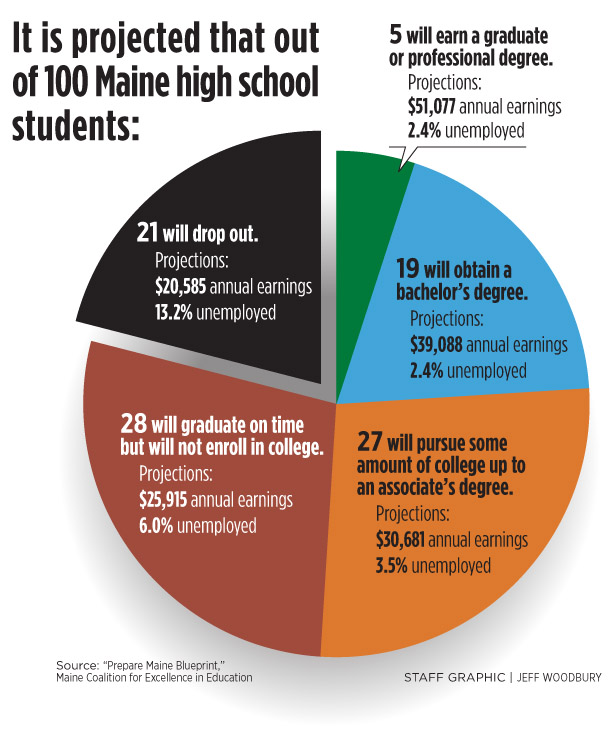Ninety percent of the fastest-growing jobs in Maine require education beyond high school. Most require a college degree. Yet, for every 100 students who enter high school, 21 likely will drop out before graduation. Another 28 may graduate but stop there. Of the 51 who are projected to continue, 27 will pursue college up to an associate’s degree. Only 24 are expected to graduate from a four-year college or university.
Maine employers find it difficult to fill jobs in areas such as health sciences, engineering and information technology. There simply aren’t enough highly educated and skilled workers. Without successful corrective action, the problem will worsen. That’s because Maine has an old population, a low birthrate and a high percentage of children born to parents with low education and income.
The good news is that we know what will correct our state’s work force problem: ensuring high-quality early childhood development.
MANY ARE NOT PREPARED TO SUCCEED
If you ask high school dropouts why they quit school, most will say they were “bored.” The truth is they were simply tired of failing. Indeed, most “dropouts” were not prepared to “drop in” in the first place. When they arrived in kindergarten, they lacked the skills they needed to succeed. They started behind and stayed behind.
It’s not that our K-12 schools are failing our kids. Nor is it that our community colleges or universities are failing them. We’re failing many of our children because we wait too long to attend to their development.
EARLY LEARNING BEGETS LATER LEARNING
Babies are born ready to learn. Early neural connections occur at warp speed. Learning is faster, easier and more fun than it will ever be again. By age 3, certain developmental windows begin to close. By the time a child starts kindergarten, 90 percent of structural brain development is complete. The foundation for lifelong learning is largely set.
Early experiences profoundly impact a child’s social, emotional, intellectual and physical development. Young children need consistent and supportive relationships with parents or other caregivers. They need frequent interactions with those adults. They need sensory stimulation, exposure to a language-rich environment and a feeling of safety and security.
And yet, many young children don’t enjoy such experiences. They are exposed to prolonged stress. They often feel neither safe nor secure. Rather than strong neural foundations that support learning, these children end up with fragile foundations that limit development.
That’s why David Brooks of The New York Times said: “By age 5, it is possible to predict, with depressing accuracy, who will complete high school and college and who won’t.” It may hurt to hear that, but it’s true. Just ask a veteran K-12 teacher or principal.
KIDS IN LOW-EDUCATION, LOW-INCOME FAMILIES AT RISK
About 20 percent of Maine children younger than 5 live in poverty (less than $22,350 a year for a family of four). Another 30 percent live between 100 percent and 200 percent of the poverty level. Most have parents who lack education or have only a high school education.
These children generally hear fewer words spoken in their homes and are read to less frequently than kids with more highly educated and affluent parents. A study showed that third-graders from middle-income families with well-educated parents had a vocabulary of about 12,000 words, while those from low-income families with undereducated parents had a vocabulary of about 4,000 words. That is significant because word knowledge is directly linked to reading comprehension.
Young children in low-income households are also more likely to be exposed to physical and psychosocial stressors that hinder development (e.g., parental depression, frequent moves, crowding, noise, substandard housing, inadequate nutrition and exposure to neurotoxins).
STARTING BEHIND AND STAYING BEHIND
To do well in school, children need self-esteem, strong literacy skills, the ability to think logically and the ability to interact well with others. However, as many as half of all children who start kindergarten lack these or other cognitive, social or emotional skills.
That’s why we shouldn’t be surprised to learn that 30 percent of Maine fourth graders can’t read at even a basic level — or that 22 percent of eighth-graders can’t do basic math — or that 21 percent of high school students drop out. Most of these kids started behind and, as hard as they tried, never could catch up.
The quality of a system’s output depends in large part on the quality of its input. That’s true with manufacturing fine wood furniture and it’s true with developing strong human minds. If we continue to consider our “education system” as starting at kindergarten, we’ll continue to fail many of our children — and our economic future.
INVESTMENT WITH HIGHEST RETURN
Equipping young children with skills to succeed is not simply a moral or social obligation. It’s an economic imperative. Economic studies show that investments in high-quality early education produce a higher per-dollar return than K-12 schooling, college and later job training. Every dollar invested returns about 10 cents each year for the rest of the child’s life.
Yet there is a disconnect between what we know and what we do. While 85 percent of a child’s core brain structure is formed by age 3, less than 4 percent of public investment on education and development have occurred by that time.
Early care and education funding is often one of the first things to be cut by governments with budget deficits. The claim is that we simply “can’t afford it.” That kind of thinking is not only shortsighted; it’s fiscally irresponsible.
Hundreds of millions of taxpayer dollars are spent each year on special education and other remedial services to deal with the consequences of low education and unemployment. That includes food, housing and medical care subsidies, as well as criminal justice, child protection and substance abuse costs.
PROVEN STRATEGIES THAT WORK
Though you wouldn’t know it based on our meager investments, we know which development strategies work to ensure that all children are prepared to succeed in kindergarten and beyond:
• Home visiting. Many parents want and need help to more effectively care for and educate their young children. However, less than 20 percent of new families can access home visiting services.
• Family literacy. Many parents want and need help to improve their literacy skills. They want to be able to read to their children and attain economic self-sufficiency. But family literacy services are not available everywhere.
• Early care and education. Over 65 percent of Maine children younger than 5 live in a household where all adults work. Yet we have a severe shortage of high-quality center- and home-based early care and education programs. The shortage for infants and toddlers is especially acute.
• Public pre-kindergarten. Less than half of Maine’s public schools offer education programs for 4-year-olds. Statewide, only about 25 percent of 4-year-olds are served.
• Quality. Early childhood teachers have one of the most important jobs in education. Yet they are paid, on average, little more than half of what public K-12 teachers are paid. This affects a staff’s education, training, turnover and quality.
To ensure Maine’s future prosperity, we must increase public and private investments in these and other proven strategies. We must build partnerships that bridge public pre-K, Head Start and early care and education services. We must increase the pay of skilled early childhood educators.
In short, we must value early education not just with words, but with actions. Until we do, many of our children will continue to start behind and stay behind. Our children deserve better. Our economy deserves better. Let’s get to work.
Steve Rowe was Maine’s attorney general from 2001 to 2009.
Send questions/comments to the editors.




Success. Please wait for the page to reload. If the page does not reload within 5 seconds, please refresh the page.
Enter your email and password to access comments.
Hi, to comment on stories you must . This profile is in addition to your subscription and website login.
Already have a commenting profile? .
Invalid username/password.
Please check your email to confirm and complete your registration.
Only subscribers are eligible to post comments. Please subscribe or login first for digital access. Here’s why.
Use the form below to reset your password. When you've submitted your account email, we will send an email with a reset code.